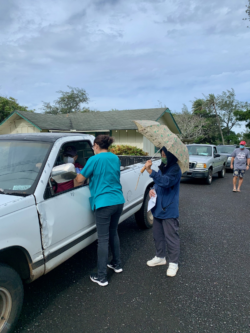Kalaupapa Gets Vaccinated

Photo courtesy of DOH
By Catherine Cluett Pactol
Residents and employees in Kalaupapa received COVID-19 vaccines last week delivered to the settlement.
Dr. Glenn Wasserman, chief of the Communicable Disease and Public Health Nursing Division of the Hawaii Department of Health, and two DOH public health nurses flew to Kalaupapa Airport last Monday.
“It is gratifying to be able to protect our Kalaupapa patients and community with these vaccinations. Our patients are elderly with significant comorbidities that make them especially vulnerable to COVID-19,” said Dr. Wasserman. “We’ll be back in four weeks to administer a second dose of the Moderna vaccine to those who have now received their initial inoculations.”
Kalawao County reported its first and only COVID-19 case in December, and was the last county in the U.S. in which someone tested positive.
“Residents are very appreciative to have been included in the vaccination program,” said Kenneth Seamon, Kalaupapa DOH administrator. “Protection from COVID-19 is critical to us since we do not have quick and easy access to medical services. We are grateful to Mokulele Airlines, which scheduled a special flight to deliver the vaccine, and everyone else who made this happen.”
Last week, the DOH announced a COVID-19 variant L452R had been detected in Hawaii. This strain of COVID-19 was first detected in Denmark in March 2020. It is now found in more than a
dozen U.S. states. Though science has not shown the L452R variant spreads more quickly or poses a greater threat than other COVID-19 strains, officials are concerned because it has been linked to a growing number of cases in California, including several large outbreaks.
“Hawaii is not immune to new strains,” said Char. “The arrival of L452R reminds us we must wear masks, maintain physical distance from people outside our immediate households, and avoid crowds. These safe practices coupled with COVID-19 vaccines will help us stop the spread.”
According to the CDC, current vaccines “likely” offer some protection against new strains of COVID-19.
“Scientists are working to learn more about these variants to better understand how easily they might be transmitted and the effectiveness of currently authorized vaccines against them,” stated a CDC briefing last week. “New information about the virologic, epidemiologic, and clinical characteristics of these variants is rapidly emerging… The virus would likely need to accumulate multiple mutations in the spike protein to evade immunity induced by vaccines or by natural infection.”











Don't have a Molokai Dispatch ID?
Sign up is easy. Sign up now
You must login to post a comment.
Lost Password